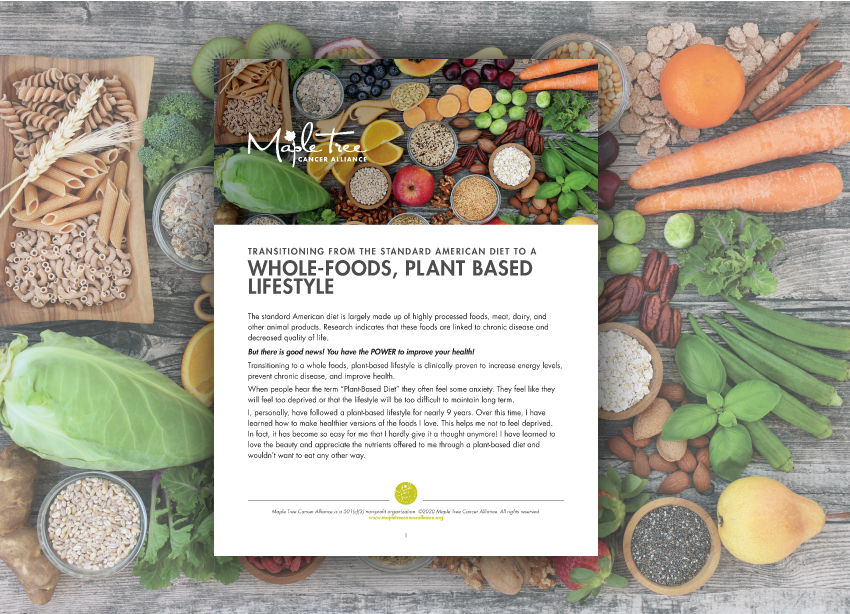This month, we are focusing on teaching you how to incorporate more plants into your diet.
A whole foods, plant-based diet is one that is centered on whole, unrefined, or minimally refined plant foods. This includes fruits, vegetables, tubers, whole grains, and legumes.
At the same time, it limits your intake of animal products like meat, chicken, fish, dairy products, eggs, and things like oil, refined sugar, bleached flour. This is because highly processed foods, meat, dairy, and other animal products are linked to chronic disease and a decreased quality of life.
There are many benefits associated with the transition a plant-based lifestyle. Research supports the following:
- Less inflammation: Chronic inflammation is linked to heart disease, stroke, type 2 diabetes, and autoimmune diseases. Foods like meat, cheese, vegetable oils, and processed foods often exacerbate inflammation. On the other hand, switching to a plant-based diet decreases the level of inflammation markers in the body. Specifically, the level of C-reactive protein drops significantly.
- Disease Prevention: Consuming a whole foods, plant-based diet can prevent, stop, or even reverse some chronic illnesses, including heart disease and type 2 diabetes!
- Weight Management: Research indicates that those who consume a plant-based diet have a lower body mass index than those who do not.
- Lower Cholesterol Levels: Studies show cholesterol levels drop as much as 35% after switching to a whole foods, plant based diet.
- Improved Mental Clarity: A whole foods, plant-based diet improves cognitive function and protects against dementia and Alzheimer’s disease. In addition, many people see improvements in memory and ability to concentrate.
In other words, your food choices matter – and you have the POWER to improve your health!
When people hear the term “Plant-Based Diet” they often feel some anxiety. They feel like they will feel too deprived or that the lifestyle will be too difficult to maintain long term.
But it doesn’t have to be that way!
Start with baby steps. One snack at a time. One meal at a time. One day at a time….Here are some ways you can begin to incorporate more plants into your diet:
- Try one meal at a time: Some people find it is easier to take a gradual approach to switching to a whole foods, plant-based diet. Try changing one meal at a time. In other words, eat plant-based breakfasts for a week. The second week, add in plant-based lunches, as well. Finally, the third week, add plant-based dinners.
- Focus on starches: Of course, you want to eat a lot of leafy greens while following a whole foods, plant-based lifestyle. However, leafy greens won’t keep you full for very long. If your meals also include starches like sweet potatoes, whole grains, and legumes, it will help sustain you. Aim for around 1,000 calories each day from legumes, whole grains and starchy vegetables.
- Start with foods you already know and love. If you know that you really like a vegetable or fruit start incorporating that food more often in your diet. Get creative and search for recipes that uses this food in a variety of ways. If you know you like sweet potatoes, for example, you can try them roasted on top of a salad, or in a soup.
- Meal plan. Pick a day of the week that you have time to sit and think about what you want to prepare that week. Double the recipe if you like it so you can easily have lunch planned the next day, or freeze half for an easy dinner in a week or two. This also will help you look forward to your meals.
- Know your “why.” If you are having a hard time transitioning into a completely plant-based diet, think of one reason why you want to make this lifestyle change. It could be to feel more energized, reduce internal damage you may have or to simply feel empowered to have control in a healthy life! Focus on that reason whenever you feel like you’re falling off. Don’t beat yourself up if you fall off track a couple times, focus on progress, not perfection.
- Listen to your body. After you eat a plant-based meal, take notice of how your whole body feels. Notice if you have more energy, or if you’re able to digest more easily. You may notice you will start to crave whole foods more often! Your body will tell you what is good for you, if you listen.
Over time, you will learn how to make healthier versions of the foods you love. Rather than feeling deprived, you will learn to love the beauty of plant-based foods – their vibrant colors. Their smells. Their natural sweetness.
It will change the way you look at food.
We want to help you get started on the right track! Our Plant-based challenge is completely free, and will give you the tools you need to change your diet for the better!

